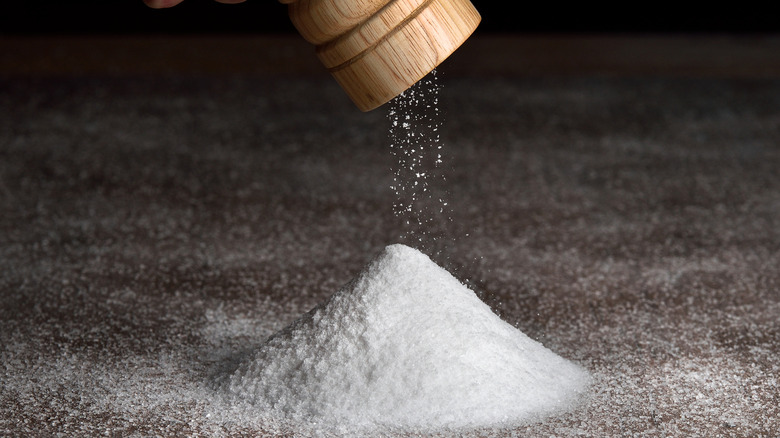If You're Craving Salt, It Could Be A Sign Of This
Most of us love a good salty snack — crispy potato chips, crunchy pretzels, and cheesy crackers hit the spot in a way that sweet stuff just can't. Since our ancestors used to struggle to find sources of salt, it became an addictive taste, knowing we needed it to survive (via Healthline). But what does it mean if you're craving salt when it's readily available and in many of our typical foods?
Sodium is everywhere. Not only does it flavor food, but it also acts as a preservative, so it's plentiful in processed foods (via Harvard T.H. Chan School of Public Health). Our bodies need a minimum of 500 milligrams a day, but the Guidelines for Adequate Intakes (AI) of sodium suggest an AI of 1,500 milligrams a day for men and women over the age of 14. Often, we get way too much – most Americans consume 3,400 milligrams a day! In large quantities, it can lead to high blood pressure, heart disease, stroke, and calcium loss.
Too much salt isn't good for us, but it's also necessary for survival (via Harvard T.H. Chan School of Public Health). A minimal amount of sodium is needed for healthy nerve impulse, muscle contraction and relaxation, and balance between water and minerals. If you're craving salt, it could be a sign that something is missing.
What your salt cravings might mean
There are a few reasons why you could be craving salt, often indicating a health condition. A common cause is dehydration, according to Healthline. When the fluid levels in our bodies get too low, we'll often crave salt so we're motivated to drink more water or eat hydrating foods. Other symptoms of dehydration are dizziness, headache, and rapid heart rate. A similar reason why you may be craving salt is an electrolyte imbalance. Since the fluids in our bodies carry important minerals like sodium, low fluid levels can throw our electrolyte levels out of balance. This can lead to headaches, confusion, and fatigue.
Addison's disease is a rare disease of the adrenal glands that affects the amount of hormones produced. People with Addison's disease often crave salt, in addition to experiencing low blood pressure, weight loss, and persistent diarrhea. High stress can also cause salt cravings — research shows that people with higher amounts of sodium produce less cortisol (the stress hormone) during times of stress.
Reproductive health can impact cravings for salt, such as during pregnancy or while experiencing premenstrual syndrome (PMS). During pregnancy, excess vomiting and diarrhea can cause dehydration, leading to salt cravings. During PMS, you may experience a wide range of symptoms, especially intense food cravings.


